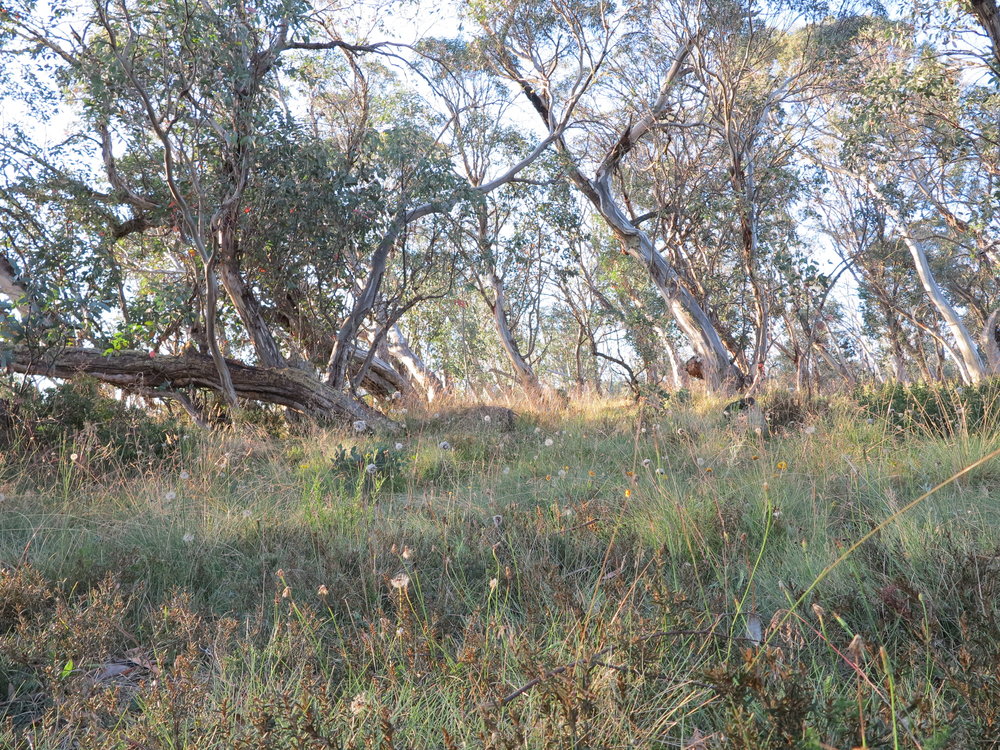We had been driving all day, heading nowhere more specific than north, when we pulled into the park. Lachy had called the Parks service, as directed on the website, to let them know we’d be camping there for the night. The woman on the phone hadn’t even heard of the place before. It is a small green rectangle at the northern edge of Victoria, set amongst arrow-straight roads and agricultural land. The campsite lay in the shadow of a single enormous boulder. We climbed it and stared out over the flat country extending to the hazy horizon. On the way down we stumbled on a wallaby grazing, and crouched down to watch it crunching unperturbed a few feet in front of us.
Darkness fell as we cooked a stew. By the time the meal was ready, our fire was the only light. Patrick decided to take a walk and was lost to the dark at once. It was only when it stopped that I realised my ears had been ringing from the constant noise of our everyday lives: voices, music, engines whirring, electronics buzzing. I became aware of the silence, and any creak or bird call that broke it. I realised how rarely I had heard true silence before, even in the relative quiet of the city at night. I lay on the grass in the darkness and felt the world beyond the city flooding all my senses.

‘More and more of us live more and more separately from contact with nature,’ says Robert Macfarlane, in his introduction to Nan Shepherd’s The Living Mountain. ‘We have come increasingly to forget that our minds are shaped by the bodily experience of being in the world.’ In our day-to-day lives we can take the tram rather than feel the cold as we walk, or keep to an air-conditioned room on a sweltering afternoon. We have become so good at managing our own environments that we can sometimes forget that feeling the force of the seasons is part of the experience of being human.
Even amongst people who care deeply about the environment, it seems that Macfarlane’s observation is a true one. When we talk so frequently about “saving” and “preserving” the “unspoilt” and “untouched” landscapes, it can be easy to forget that we are ourselves an integral part of the natural world, and that our experience of it is vitally important. It is too easy to never stray from the footpath, to read a sign about the bark of a tree but not feel it for ourselves, as though nature were already a museum. We need protected areas, but we must never isolate ourselves entirely from the natural world. How can we truly care about something that we have nothing to do with?
Nan Shepherd wrote The Living Mountain in 1945, though it wasn’t published until 1977. It is a short book, written in prose as striking and meandering as the valleys of the Cairngorm Plateau it describes in such intimate, personal detail. Macfarlane defines Shepherd’s attitude as ‘bodily thinking’: nature not as something to view, but as a whole-body experience. This is something that has clearly influenced Macfarlane’s own exploration and writing. Neither writer has much interest in climbing a mountain just to get to the top.
For both Shepherd and Macfarlane, ‘bodily thinking’ represents total immersion in their surroundings. Shepherd follows rivers to their sources, just because. In his 2007 book The Wild Places, Macfarlane camps on a frozen tarn, walks along the beach during a storm, climbs trees, sleeps in the hollow of a tree trunk. His great friend Roger Deakin wrote an account of wild swimming across the whole of the British Isles, entitled Waterlog. Their writing is informed by these encounters with nature, inspired by them, could not exist without them.

We can all learn something from these adventurer-writers. To stray from the path; to feel soil beneath our bare feet; to drink the water, wade in the water, swim; to sleep under the open sky or in the shelter of trees; to seek out silence and darkness. If we cannot make time at this moment to extend our reach beyond the city, we can still immerse ourselves in the tendrils of wildness that snake even into metropolitan Melbourne. To let ourselves get soaked in the rain once in a while; to open the windows and listen to the birds calling while we work at our desks.
Macfarlane writes ‘We are literally losing touch, becoming disembodied, more than in any previous historical period.’ But unlike the difficult work of restoring damage to our ecosystems, this is a loss that each of us can remedy, quite simply, ourselves. Anyone has the power to keep in touch, in that physical sense, with nature. All we have to do is open our eyes, breathe deeply, and reach out our hands.
Banner image courtesy of Alex Mullarky.


Leave a Reply